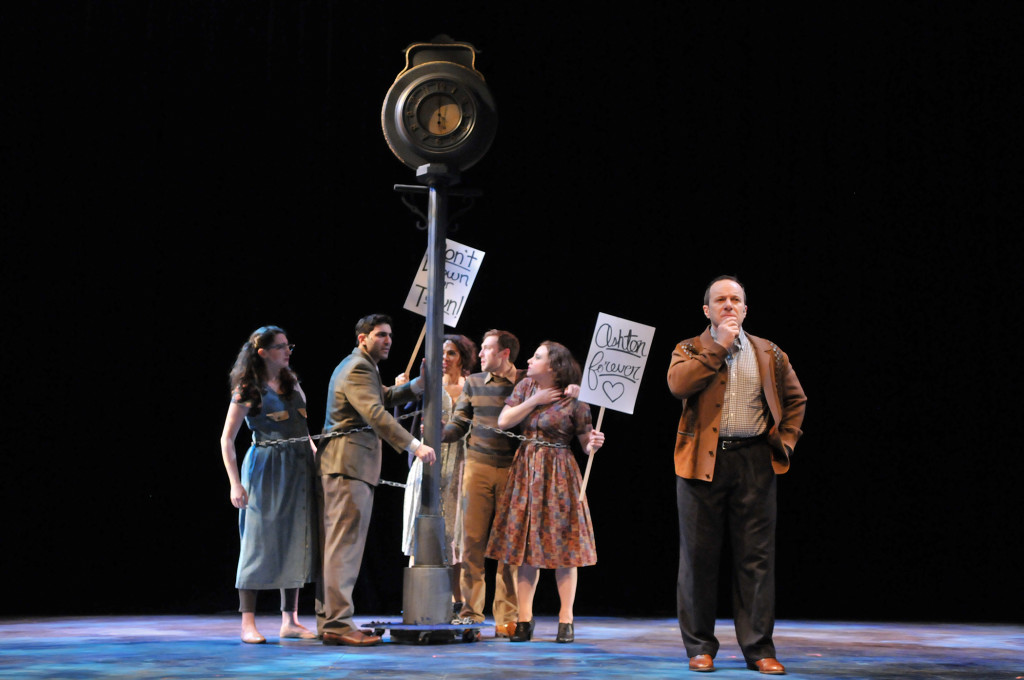
Photo credit: Craig Bailey/Perspective Photo
Presented by SpeakEasy Stage Co.
Book by John August
Music & Lyrics by Andrew Lippa
Based on the Novel by Daniel Wallace and the Columbia Motion Picture Written by John August
Directed by Paul Daigneault
Assistant Director Alex Lonati
Musical Direction by Matthew Stern
Choreography by Larry Sousa
MAR 13 – APR 11, 2015
Stanford Calderwood Pavilion
Boston Center for the Arts
527 Tremont St.
SpeakEasy on Facebook
Review by Kitty Drexel
(Boston, MA) I did not enjoy Big Fish. I did enjoy SpeakEasy’s production. The performances from the cast were, as always, exemplary but the script has many problems. Follow along as I list the major issues and make the conscious decision not to detail the minor ones.
Big Fish is about a father and son attempting to understand each other. In an opening scene reminiscent of Peter Falk’s introduction of The Princess Bride to a young Fred Savage, we learn that Edward teaches life lessons in tall tales and personal fantasy. Edward Bloom is a mystery to his son, Will. Will grows up not knowing what is truth and what is epic hyperbole. In this musical, they learn to trust each other’s experiences.
Leaving aside that Big Fish is yet another story about a White, straight, cis man claiming his potential in the forgiving world that celebrates his privilege while making parallels to epic tales from historical myth, it still crumbles under scrutiny. Example one: this production utilizes only one of the many talented women of color in the Boston area. Then it goes ahead and turns her into a Magical Negro by casting her in the role of the Witch (Aubin Wise). To SpeakEasy’s credit, Wise makes a stellar Witch. She sings and acts the crap out of her role but she’s also good enough that she could have played any of the other minor, non-WOC assigned characters.
Example two: The role of Edward Bloom (Steven Goldstein) requires that the actor play many ages, from boy to aging adult. Mr. Goldstein sings and acts the Hell out of his role but is no spring chicken. He gives nuances to Bloom because he’s had appropriate life experience to put into his character. Sandra Bloom is played by the excellent Aimee Doherty. There is an obvious age difference between the two actors. If a gentleman with the years of Mr. Goldstein can play a full range of ages as Edward Bloom then a similarly mature woman can do the same in the role of his college educated wife. If we’re already suspending our disbelief, it would be an easy thing to suspend it a little more to allow for a middle-aged actress as Sandra. To be excruciatingly clear: the casting of Doherty is not under scrutiny. (She was marvelous.) Rather, the decision to cast a woman noticeably younger than the male lead is.
Example three: The musical/novel/movie makes a hero out of Bloom for befriending a disabled person. It isn’t enough that the hillbilly folk of Alabama think that being abnormally tall is an offense punishable by death but then Bloom is labeled as extraordinary for considering the giant’s potential humanity. Karl the Giant, as played by Lee David Skunes, is intelligent, graceful and pithy. It would take an average of 5 minutes to gauge his capacity for wrongdoing if one only took the time. Yet, the town hates Karl because he’s tall. Not because he might eat their babies, rob their bank or even throw stones. Bloom saves Karl from a town of ignorant fools and gets credit not for teaching the townsfolk about their bigotry but delivering Karl to the circus. No one gets extra credit for fulfilling the barest of ethical minimums. Bloom should especially not get credit for treating someone different as if they were a person because he already knows better.
For interested actors, certain songs are worth a listen or a concentrated study. The score is man-heavy and features several storytelling songs that could be good for auditions or performance. “Be The Hero,” “Stranger” and “Daffodils” are notable selections for the dudes. “Two Men in My Life” and “I Don’t Need A Roof” would serve for the dudettes. “Time Stops” is a sweetly romantic duet.
The examples go on and on. I will not. That being said, crew and the cast do a wonderful job. Go ahead and see Big Fish. It’s a fun production with jaunty music with a country flair but be wary of the massive holes in its construction. The stagecraft elements are top notch even if the projection design wavers between hokey and pleasant. But please don’t bring your children. We don’t want them learning that women only exist to support men’s adventures and that the same men should be lauded for exhibiting common decency.
